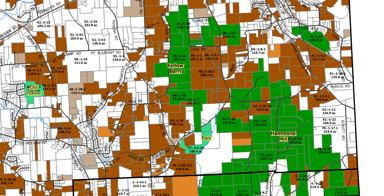July 1, 2011
So what changed?
At first glance, the DEC press release on the state's decision to allow hydrofracking didn't look very encouraging. A lot of it requires trusting the DEC to be an effective regulator - "DEC enforcement and oversight of high-volume fracturing will be rigorous and effective" - which has been less and less of a good idea over the last few years, including in Dryden.
However, there are some pieces worth noting beyond those promises. These are the pieces I think most clearly affect Dryden, especially with regard to the existence and placement of wells.
Local Land Use & Zoning: Applicant must certify that a proposed activity is consistent with local land use and zoning laws. Failure to certify or a challenge by a locality would trigger additional DEC review before a permit could be issued.
I'll definitely want to see the final language on this. Could that DEC review decide to ignore zoning? Will the types of zoning be limited? On the surface, however, this looks like it would clearly make the ban Dryden will consider July 20th that much more important and clearly legal. (The state may have landed at this compromise.) Update: No, it's definitely clearly fuzzy.
Drilling Banned Within All Primary Aquifers and on State-Owned Land Including State Forest and Wildlife Management Areas
According to DEC maps, the nearest "Primary Aquifer" is in Cortland County, though Dryden does (I think from this) have a less-tightly-regulated principal aquifer, the Virgil Creek aquifer.
When I first read that bullet, I thought Yellow Barn and Hammond Hill State Forests would be off-limits to drilling, but then I saw this:
Surface drilling would be prohibited on state-owned land including parks, forest areas and wildlife management areas;
Clarifying it to surface drilling means that it has much less effect, especially for our pretty chopped-up state forests.

Approximate gas leases in the southeastern corner of the Town of Dryden.
Well water protection and other water protection: No permits would be issued for sites within 500 feet of a private water well or domestic use spring. No permits may be issued for a proposed site within 2,000 feet of a public drinking water supply well or reservoir at least until three years of experience elsewhere have been evaluated. No permits will be issued for well pads sited within a 100-year floodplain.
It will be interesting to see how this one plays out. I don't think wells are as commonly marked on maps as, say, buildings, so I'm guessing there will be a lot of surveyors out for this one. It does seem likely to keep drilling out of (or on the edge of) developed rural neighborhoods - with a possible odd exception for places with public water where few wells are still in use.
(I'm also curious what qualifies as a public well. I think mobile home park water supplies would count for that, for example - but I'm not sure.)
Those are just initial interpretations of something that's a press release, not the final rules. These are the bits that struck me as most interesting - by all means, read the DEC press release for yourself!
Update: Also making a big difference - Cornell will continue to ban fracking on its land. They own a pretty big chunk of Dryden, especially on top of Mount Pleasant.
Posted by simon at July 1, 2011 9:50 AM in energy , planning and zoningNote on photos